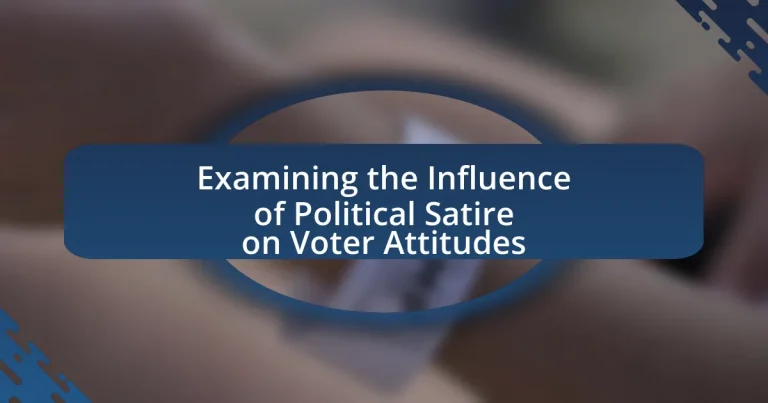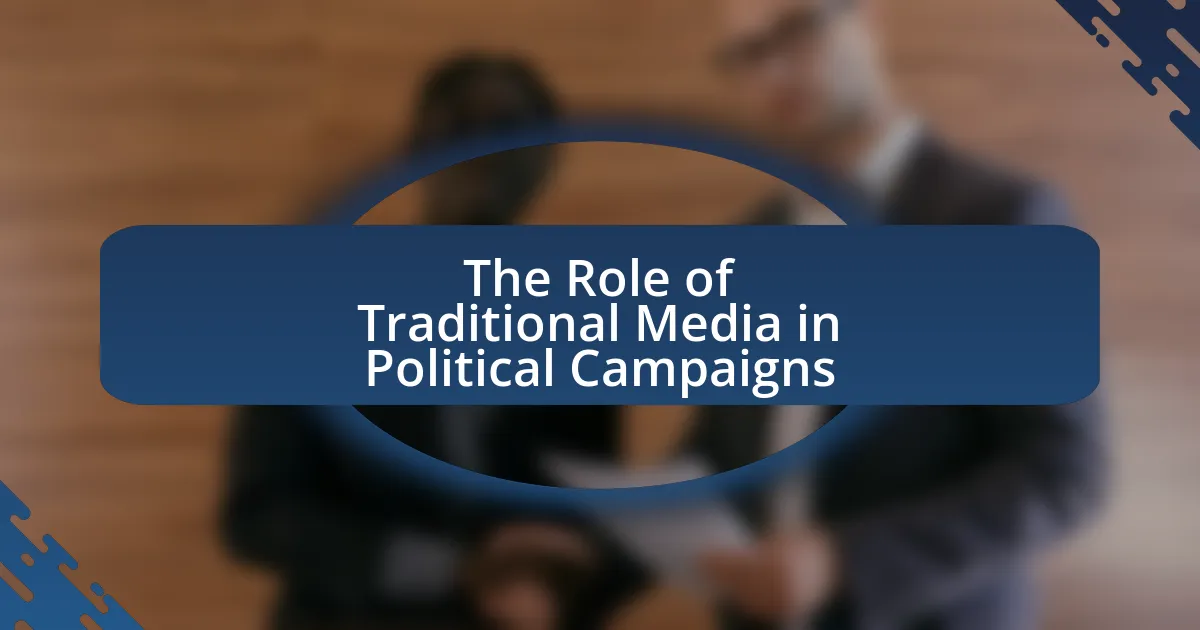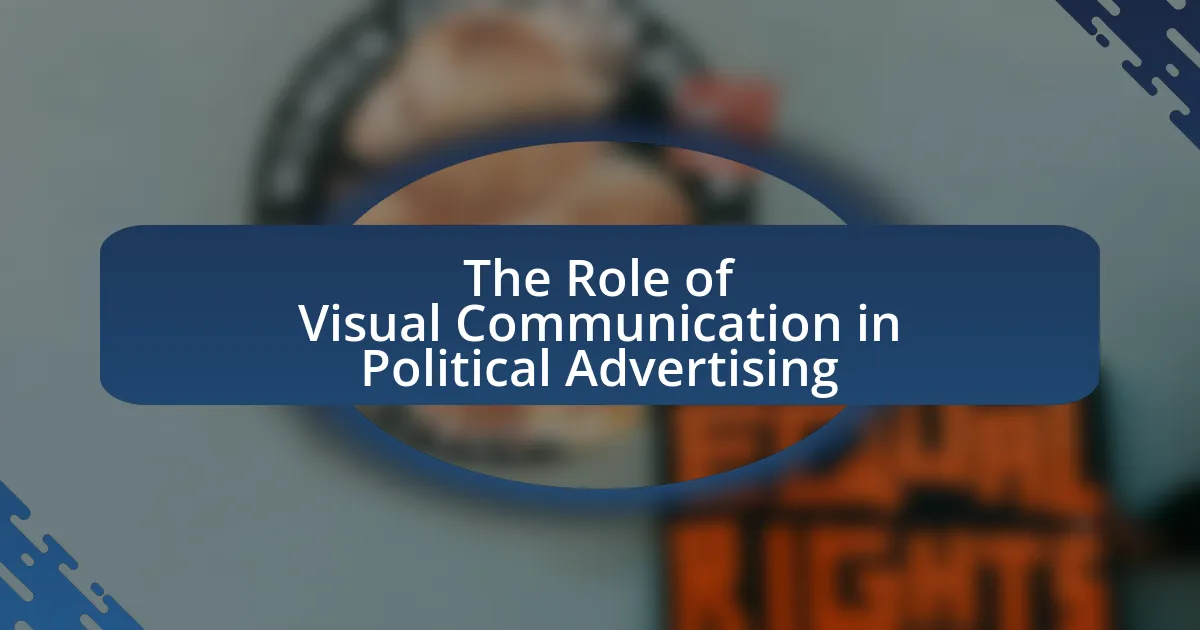The article examines the influence of political satire on voter attitudes, highlighting its role in shaping perceptions of candidates and political issues. It discusses how exposure to political satire enhances political engagement, particularly among younger audiences, by making complex topics more accessible. Key techniques used by satirists, such as humor and exaggeration, are explored, along with the impact of satire on civic participation and voter behavior. The article also addresses the potential risks of misinformation and polarization associated with political satire, while emphasizing its significance in contemporary political discourse.
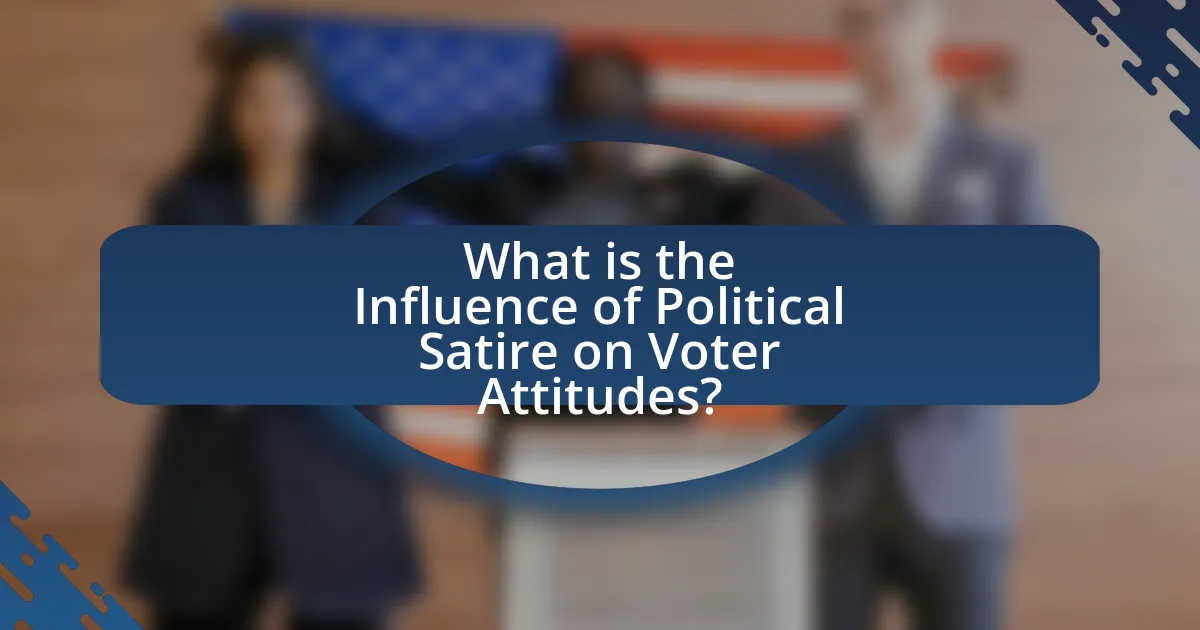
What is the Influence of Political Satire on Voter Attitudes?
Political satire significantly influences voter attitudes by shaping perceptions of candidates and political issues. Research indicates that exposure to political satire can enhance political engagement, particularly among younger audiences, by making complex political topics more accessible and entertaining. For instance, a study published in the journal “Political Communication” by researchers at the University of Pennsylvania found that viewers of satirical programs like “The Daily Show” and “Saturday Night Live” were more likely to discuss political issues and participate in elections compared to those who did not watch such content. This suggests that political satire not only informs voters but also motivates them to take action, thereby impacting overall voter behavior and attitudes toward the political landscape.
How does political satire shape public perception of political figures?
Political satire significantly shapes public perception of political figures by using humor and exaggeration to critique their actions and policies. This form of media often highlights flaws and inconsistencies, making complex political issues more accessible and engaging for the audience. Research indicates that exposure to political satire can lead to increased political awareness and engagement, as viewers are more likely to discuss and reflect on the issues presented. For instance, a study published in the journal “Political Communication” by researchers at the University of Pennsylvania found that individuals who consume political satire are more informed about political events and more likely to participate in political discussions. This suggests that political satire not only influences individual perceptions but also contributes to broader public discourse surrounding political figures.
What techniques do satirists use to convey their messages?
Satirists use techniques such as exaggeration, irony, parody, and humor to convey their messages. Exaggeration amplifies flaws or absurdities in subjects, making them more noticeable; for instance, political figures may be depicted with exaggerated traits to highlight their incompetence. Irony contrasts reality with expectations, often revealing hypocrisy in political discourse. Parody imitates the style of a subject to critique it, as seen in television shows that mimic political speeches to expose their absurdities. Humor engages audiences, making complex political issues more accessible and prompting reflection on societal norms. These techniques effectively influence voter attitudes by encouraging critical thinking and engagement with political content.
How does humor affect the reception of political messages?
Humor significantly enhances the reception of political messages by making them more relatable and engaging for the audience. When humor is incorporated into political discourse, it can lower defenses, allowing individuals to process information more openly. Research indicates that humorous political satire can increase audience engagement and retention of the message, as seen in studies like “The Effects of Political Satire on Political Attitudes” by Jeffrey M. Berry and Sarah Sobieraj, which found that viewers of satirical content were more likely to discuss political issues and express interest in political participation. This suggests that humor not only entertains but also serves as a tool for political communication, effectively shaping voter attitudes and behaviors.
Why is political satire significant in contemporary politics?
Political satire is significant in contemporary politics because it serves as a powerful tool for critiquing and influencing public opinion about political figures and policies. By using humor and exaggeration, political satire can simplify complex political issues, making them more accessible to a broader audience. Research indicates that exposure to political satire can enhance political engagement and awareness among viewers, particularly younger demographics. For instance, a study published in the journal “Political Communication” by researchers at the University of Pennsylvania found that individuals who consume political satire are more likely to discuss political issues and participate in civic activities. This demonstrates that political satire not only entertains but also plays a crucial role in shaping voter attitudes and fostering democratic participation.
What role does satire play in political discourse?
Satire plays a critical role in political discourse by providing a means to critique and challenge political figures and policies through humor and exaggeration. This form of expression can simplify complex political issues, making them more accessible to the public. Research indicates that political satire can influence voter attitudes by shaping perceptions of candidates and issues; for instance, a study published in the journal “Political Communication” found that exposure to satirical content can increase political engagement and awareness among viewers. By highlighting absurdities in politics, satire encourages critical thinking and can motivate audiences to seek further information, thereby enhancing democratic participation.
How does political satire differ from traditional news reporting?
Political satire differs from traditional news reporting primarily in its use of humor and exaggeration to critique political figures and events. While traditional news reporting aims to present facts objectively and inform the public without bias, political satire employs comedic elements to provoke thought and entertain, often highlighting absurdities in political discourse. For instance, programs like “Saturday Night Live” or “The Daily Show” use satire to comment on current events, influencing public perception and engagement by making complex political issues more accessible and relatable. This approach can lead to increased awareness and discussion among viewers, as evidenced by studies showing that audiences of satirical content often demonstrate higher political knowledge compared to those who consume only traditional news.
What are the potential impacts of political satire on voter behavior?
Political satire can significantly influence voter behavior by shaping perceptions of candidates and political issues. Research indicates that exposure to political satire often leads to increased political engagement, as viewers may become more informed and motivated to participate in elections. For instance, a study published in the journal “Political Communication” by researchers at the University of Pennsylvania found that individuals who consumed satirical content were more likely to discuss political topics and vote, demonstrating a correlation between satire consumption and civic participation. Additionally, political satire can alter voters’ attitudes by highlighting inconsistencies or flaws in political figures, which can lead to decreased support for those candidates. This effect is particularly pronounced among younger voters, who are more likely to consume satire through digital platforms.
How can satire influence voter turnout?
Satire can influence voter turnout by engaging younger audiences and making political issues more relatable. Research indicates that political satire, particularly through platforms like television and social media, can increase political awareness and motivate individuals to participate in elections. For instance, a study by the Pew Research Center found that individuals who consume satirical content are more likely to discuss political issues and express intent to vote, demonstrating a direct correlation between satire consumption and increased voter engagement.
What are the risks of misinformation in political satire?
Misinformation in political satire poses significant risks, including the potential to mislead audiences about political facts and issues. When satire distorts reality, it can create confusion among viewers, leading them to form opinions based on false premises. For instance, a study by the Pew Research Center found that 64% of Americans believe that political satire can mislead people about political issues, indicating a widespread concern about its impact on public understanding. Additionally, misinformation can contribute to polarization, as individuals may reinforce their biases by consuming satirical content that aligns with their views, further entrenching divisions in society.
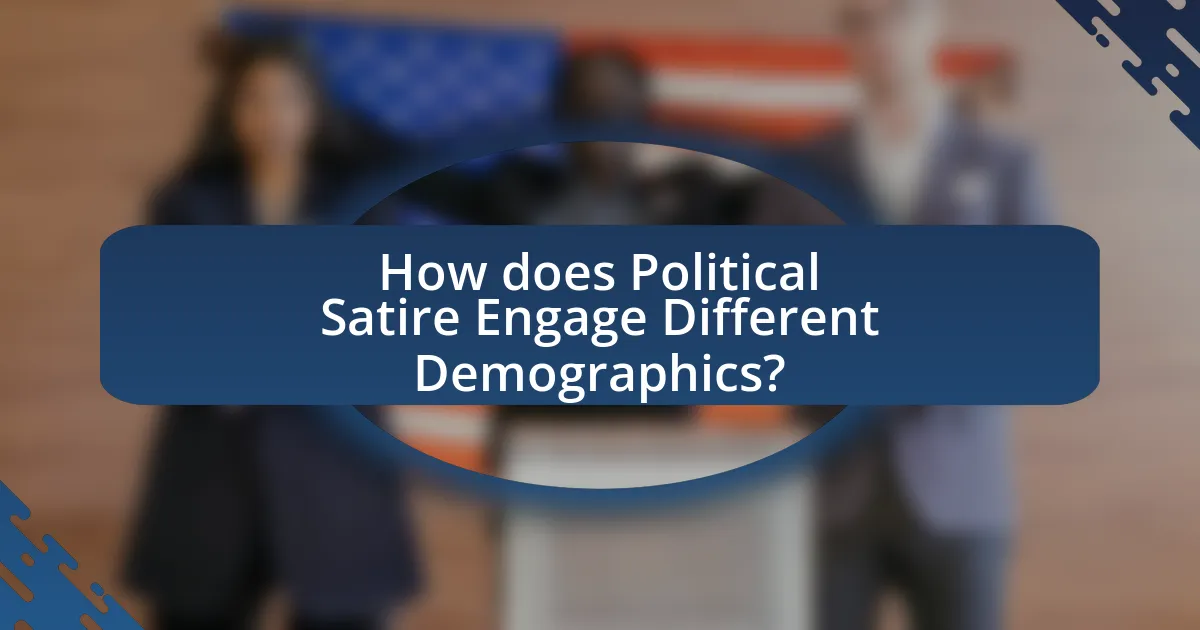
How does Political Satire Engage Different Demographics?
Political satire engages different demographics by utilizing humor and relatable content to address political issues, thereby appealing to various age groups, educational backgrounds, and cultural contexts. For instance, younger audiences often connect with satire through social media platforms, where quick, humorous takes on political events resonate more than traditional news formats. Research indicates that shows like “The Daily Show” and “Saturday Night Live” attract younger viewers, with 60% of their audience aged 18-34, highlighting the effectiveness of satire in engaging this demographic. Conversely, older demographics may prefer more traditional forms of satire, such as editorial cartoons or late-night talk shows, which often provide a more nuanced critique of political events. This bifurcation in engagement illustrates how political satire can be tailored to meet the preferences of diverse groups, ultimately influencing voter attitudes by making political discourse more accessible and entertaining.
What demographic groups are most influenced by political satire?
Young adults and college-educated individuals are the demographic groups most influenced by political satire. Research indicates that these groups are more likely to engage with satirical content, which often shapes their political opinions and voting behaviors. A study published in the journal “Political Communication” found that younger audiences, particularly those aged 18-29, are significantly impacted by political satire, as they tend to consume media through platforms like social media where satire is prevalent. Additionally, individuals with higher education levels are more likely to appreciate and critically engage with satirical content, leading to a greater influence on their political attitudes.
How do age and education level affect the reception of satire?
Age and education level significantly influence the reception of satire. Younger audiences tend to have a higher tolerance for and understanding of satire, often due to exposure to various media forms that utilize humor and irony. In contrast, older individuals may struggle with satire, particularly if it challenges their established beliefs or cultural references.
Education level also plays a crucial role; individuals with higher education are generally better equipped to recognize and appreciate the nuances of satire, as they are more familiar with critical thinking and analytical skills. Research indicates that educated audiences are more likely to engage with satirical content, as they can discern the underlying messages and social critiques. For instance, a study published in the Journal of Communication found that individuals with a college degree were more likely to understand and appreciate satirical news compared to those with lower educational attainment.
What role does social media play in disseminating political satire among different demographics?
Social media serves as a crucial platform for disseminating political satire across various demographics by enabling rapid sharing and engagement with satirical content. This immediacy allows users from different age groups, educational backgrounds, and political affiliations to access and interact with political satire, thereby influencing their perceptions and attitudes toward political issues. Research indicates that younger demographics, particularly those aged 18-29, are more likely to consume political satire on platforms like Twitter and Instagram, where humor and brevity resonate well. A study by the Pew Research Center found that 55% of young adults engage with political satire online, highlighting its role in shaping political discourse among this group. Additionally, social media algorithms promote content that garners high engagement, further amplifying the reach of political satire across diverse audiences.
How does political satire resonate with younger voters?
Political satire resonates with younger voters by engaging them through humor and relatability, making complex political issues more accessible. This demographic often consumes media through platforms like social media, where satirical content thrives, allowing for rapid dissemination and discussion. Research indicates that younger audiences are more likely to share and interact with satirical content, which can enhance political awareness and stimulate civic engagement. For instance, a study by the Pew Research Center found that 61% of younger voters reported that satire helped them understand political issues better, demonstrating its effectiveness in shaping their political attitudes.
What platforms are most effective for reaching younger audiences?
Social media platforms, particularly Instagram, TikTok, and Snapchat, are most effective for reaching younger audiences. These platforms have high engagement rates among users aged 18-29, with 71% of this demographic using Instagram and 60% using TikTok as of 2023. The visual and short-form content formats on these platforms resonate well with younger users, making them ideal for political satire and messaging aimed at influencing voter attitudes.
How do cultural backgrounds influence the interpretation of satire?
Cultural backgrounds significantly influence the interpretation of satire by shaping individuals’ values, beliefs, and social norms. For instance, satire often relies on shared cultural references and historical contexts that may not be universally understood; what is humorous or critical in one culture may be offensive or confusing in another. Research indicates that individuals from collectivist cultures may interpret satire more cautiously, as it can challenge group harmony, while those from individualistic cultures may appreciate its critical edge more readily. A study by Kalliny and Gentry (2007) in the Journal of International Consumer Marketing highlights how cultural dimensions, such as power distance and uncertainty avoidance, affect humor perception, demonstrating that cultural context is crucial for understanding satire’s intent and impact.
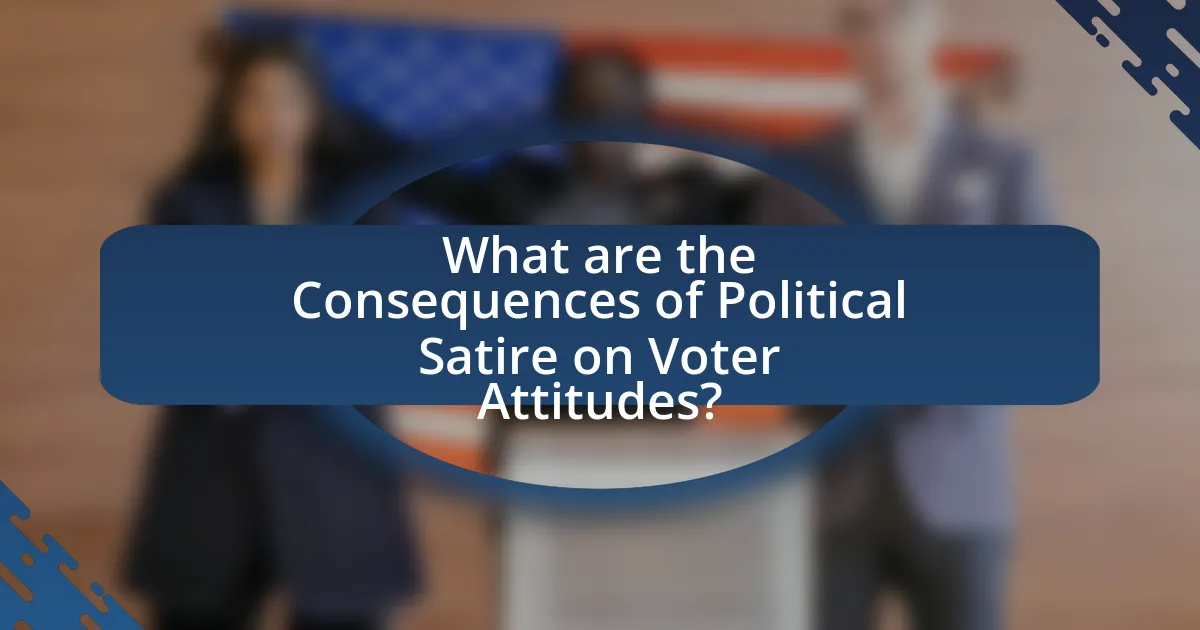
What are the Consequences of Political Satire on Voter Attitudes?
Political satire significantly influences voter attitudes by shaping perceptions of candidates and political issues. Research indicates that exposure to political satire can enhance political engagement, particularly among younger voters, by making complex political topics more accessible and relatable. For instance, a study published in the journal “Political Communication” found that viewers of satirical programs like “The Daily Show” were more likely to discuss political issues and participate in elections compared to those who did not watch such content. Additionally, political satire often serves to reinforce existing beliefs, as individuals tend to seek out humor that aligns with their political views, thereby solidifying their attitudes rather than changing them. This dual effect of engagement and reinforcement illustrates the complex role political satire plays in shaping voter attitudes.
How does political satire contribute to political polarization?
Political satire contributes to political polarization by reinforcing existing biases and creating echo chambers among audiences. Satirical content often targets specific political figures or ideologies, leading individuals to align more closely with their preferred viewpoints while dismissing opposing perspectives. Research indicates that exposure to partisan satire can increase partisan identification and decrease willingness to engage with differing opinions, as seen in studies like “The Effects of Political Satire on Political Polarization” by Jason Reifler and Andrew McGowan, which found that individuals who consume partisan satire are more likely to adopt extreme positions. This dynamic fosters an environment where political discourse becomes increasingly divisive, as satire often exaggerates and caricatures opposing views, further entrenching polarization.
What evidence exists linking satire to increased partisan divides?
Research indicates that political satire contributes to increased partisan divides by reinforcing existing biases and promoting polarized viewpoints. A study by the Pew Research Center found that individuals who consume satirical content are more likely to develop negative perceptions of opposing political groups, leading to greater ideological separation. Additionally, a 2018 study published in the journal “Political Communication” demonstrated that exposure to partisan satire heightened partisan identity and decreased willingness to engage with opposing viewpoints. These findings suggest that satire not only reflects but also exacerbates political polarization among audiences.
How can satire reinforce existing biases among voters?
Satire can reinforce existing biases among voters by presenting information in a way that aligns with their pre-existing beliefs, thereby solidifying those beliefs. When satire targets specific political figures or ideologies, it often exaggerates traits or actions that resonate with the audience’s views, leading to a confirmation bias where voters feel validated in their opinions. Research indicates that exposure to satirical content can increase polarization, as individuals are more likely to share and engage with satire that reflects their own political stance, further entrenching their biases. For example, a study published in the journal “Political Communication” found that viewers of satirical programs like “The Daily Show” and “Saturday Night Live” often interpret the humor in a manner that reinforces their political preferences, rather than challenging them.
What are the long-term effects of political satire on civic engagement?
Political satire has a significant long-term effect on civic engagement by increasing political awareness and participation among audiences. Research indicates that exposure to political satire can enhance individuals’ understanding of political issues, leading to higher levels of civic involvement. For instance, a study published in the journal “Political Communication” by researchers like Jeffrey M. Berry and Sarah Sobieraj found that viewers of political satire shows are more likely to discuss politics and participate in civic activities, such as voting and attending town hall meetings. This engagement is often attributed to the humorous framing of serious issues, which makes political content more accessible and relatable, thereby motivating individuals to become more active in their communities.
How does exposure to satire affect trust in traditional media?
Exposure to satire generally decreases trust in traditional media. Research indicates that individuals who consume political satire often develop skepticism towards mainstream news sources, perceiving them as biased or unreliable. A study by the Pew Research Center found that 62% of Americans believe that news organizations tend to favor one side in their reporting, a sentiment that is often reinforced by satirical portrayals of media bias. This skepticism can lead to a diminished credibility of traditional media outlets among audiences who regularly engage with satire, as they may view these outlets as less trustworthy compared to the more entertaining and critical perspectives offered by satirical content.
What strategies can be employed to mitigate negative effects of satire on voter attitudes?
To mitigate negative effects of satire on voter attitudes, media literacy programs can be implemented to educate voters on distinguishing between satire and factual reporting. Research indicates that individuals with higher media literacy are better equipped to critically analyze satirical content, reducing its potential to skew perceptions of political figures and issues. For instance, a study by the Pew Research Center found that media literacy initiatives can enhance critical thinking skills, enabling voters to navigate satirical messages without misinterpretation. Additionally, promoting diverse news sources can provide voters with a more balanced perspective, counteracting the one-sided narratives often presented in satire.
What best practices can enhance the positive influence of political satire on voter attitudes?
To enhance the positive influence of political satire on voter attitudes, creators should focus on accuracy, relatability, and engagement. Accurate satire ensures that the content reflects real political issues and facts, which helps build trust with the audience. For instance, studies have shown that when satire accurately portrays political events, it can lead to increased political awareness and engagement among viewers. Relatable content resonates more with audiences, making them more likely to share and discuss the satire, thereby amplifying its reach and impact. Engaging formats, such as interactive elements or social media integration, can further enhance viewer participation and discussion, fostering a more informed electorate.
